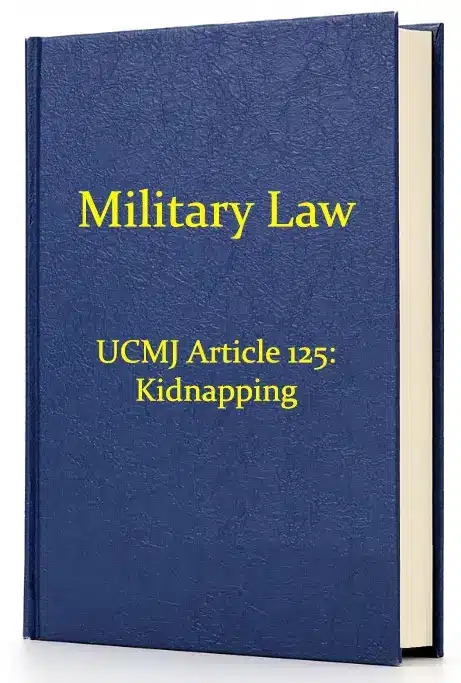The MCM states any service member may be subject to prosecution for violating Article 125 if they seize, confine, inveigle, decoy, or carry away another person and hold the other person against that person’s will.
To be convicted, the prosecution must prove that:
-
the accused seized, confined, inveigled, decoyed, or carried away a specific person;
-
the accused then held such a person against that person’s will and
-
the accused did so wrongfully.
Understanding Article 125 (Kidnapping) of the UCMJ
Article 125 uses the term inveigle to lure, lead astray, or entice by false representations or other deceit. Decoy means to attract or lure using fraud, trick, or temptation. Held means detained and must be more than a momentary or incidental detention. The holding need not have been for financial, personal gain, or any other purpose. It may be an aggravating circumstance that the kidnapping was for ransom, however.
Against that person’s will means the victim was held involuntarily. The involuntary nature of the detention may result from force, mental or physical coercion, or other means, including false representations. Suppose the victim is incapable of having a recognizable will, as in the case of a very young child or a mentally incompetent person. In that case, the holding must be against the will of the victim’s parents or legal guardian. Evidence of the availability or nonavailability of the means of exit or escape to the victim is relevant to the voluntariness of the detention, as is proof of threats or force, or lack thereof, by the accused to detain the victim.
Maximum Possible Punishment for Violations of Article 125
Service members convicted of a violation of Article 125 – Kidnapping faces a maximum possible punishment of a dishonorable discharge, forfeiture of all pay and allowances, and confinement for life without eligibility for parole.
How do you defend against Article 125 Kidnapping charges?
When facing the combined resources of the military and the current cultural climate, you need to be prepared to defend your career and your freedom. Crisp and Associates, LLC has a team of experienced trial attorneys with over 75 years of combined experience who have won these types of cases. This team includes the firm’s founder, Jonathan Crisp, a highly respected and sought-after attorney, speaker, and lecturer who has served in the U.S. Army Judge Advocate General’s Corps (JAG) since 1998 and entered private practice in 2007.
If you, or someone you know, is facing Article 125 charges for Kidnapping, you need to speak with a Military defense attorney right away. We understand what is at risk and know how to protect your career, freedom, and future so that any service member may avoid being prosecuted.


